Librarians could find themselves behind bars for 30 days for allowing “sexually explicit” LGBTQ and S&M content on their shelves under a proposed North Dakota law.
Books with graphic representations of gender and gender identity would be banned from the state’s public libraries under legislation politicians considered this week.
The plan comes amid a national wave of conservatives trying to stop children reading books on LGBTQ issues — though those moves are usually aimed at school libraries, not public ones.
Supporters of House Bill 1205 said it would preserve children’s innocence and reduce their exposure to pornography.
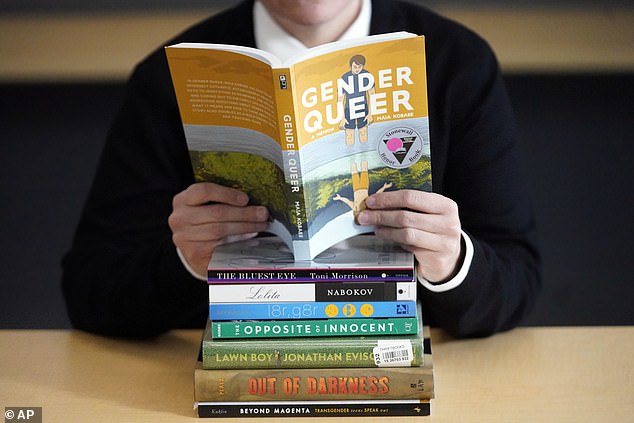
Gender Queer: A Memoir by Maia Kobabe and Other Books Questioned by Concerned Utah Parents

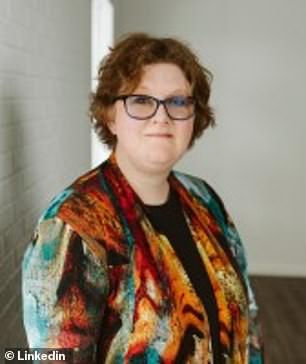
Library director Christine Kujawa of the Bismarck Veterans Memorial Public Library says she never thought she could go to jail for books
The list of prohibited content includes “deviant sexual intercourse”, “sado-masochistic abuse” and “sexual perversion”.
But it also targets “sexual identity” and “gender identity” material that many find acceptable and even useful for youth and adults interested in alternative lifestyles.
Critics say the measure is discriminatory and would give the green light to censoring material that is not genuinely obscene.
House Majority Leader Mike Lefor, a Republican, introduced the bill and said public libraries had too many books with “disturbing and disgusting” content.
Some texts describe virginity as a silly label and claim that gender is fluid, he said.
Exposing children to such content is linked to addiction, low self-esteem, devalued intimacy, rising divorce rates, unsafe sex among young people and poor well-being, he added.
Stark County’s Autumn Richard also supports the bill, warning against explicit content in the graphic novel Let’s Talk About It: The Teen’s Guide to Sex, Relationships, and Being a Human and the children’s comic Sex Is a Funny Word. ‘
Richard says the books, available in public libraries, may teach information about birth control, body image and abusive relationships, but many sections could hurt children.
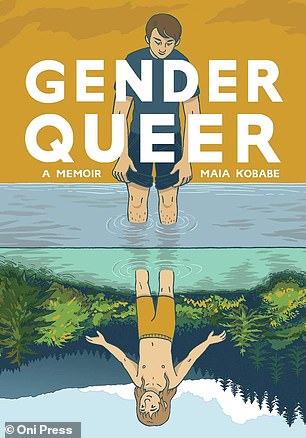
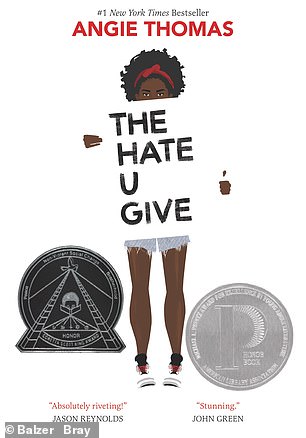
Books banned from schools include Gender Queer: A Memoir by Maia Kobabe and The Hate U Give by Angie Thomas
Tiffany Justice, founder of Moms For Liberty, a nationwide campaign to give parents more say in schools, commended North Dakoto residents for taking control of how taxpayer dollars are spent.
opinion poll
Should librarians go to jail for carrying books about “gender ideology”?
Some popular titles on “queer theory, gender ideology and critical race theory” are “contradictory to the teachings back home” for many American families, she told .
“It’s a real breach of trust, parents are concerned, and communities need to have conversations about what’s appropriate in their public libraries,” she added.
Although supporters of North Dakota’s bill have repeatedly called the sexual content “obscene,” opponents said the material in question is not actually considered legally obscene.
“Nearly 50 years ago, the Supreme Court set the high constitutional bar for obscenity,” said Cody Schuler of the American Civil Liberties Union of North Dakota, who testified against the law.
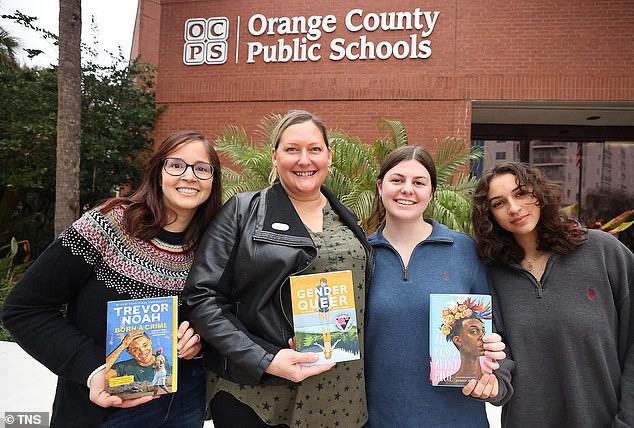
The North Dakota plan comes amid a national wave of conservatives trying to bar children from reading books on LGBTQ issues — including these Florida activists
Profanity is a narrow, well-defined category of unprotected speech that excludes works of serious literary, artistic, political, or scientific merit, Schuler said.
Few books, if any, have been classified as obscene, and the standard for restricting a library’s ability to distribute a book is even stricter, Schuler added.
The definition of pornography is also subjective, opponents of the bill said.
Library director Christine Kujawa of the Bismarck Veterans Memorial Public Library said the library has a book with two little hamsters on the cover.
At the end of the book, the two male hamsters get married.
“It’s a cute book,” Kujawa said — but it could be considered pornography under the bill because it reveals gender identity.
Seeing lawsuits for keeping books on shelves “is something I never thought I would have to consider in my career as a librarian,” Kujawa said.
In addition to banning depictions of “sexual identity” and “gender identity,” the measure specifies 10 other things that library books cannot visually represent, including “intercourse,” “sexual preferences,” and “sexual perversion.”
It does not define any of these terms.
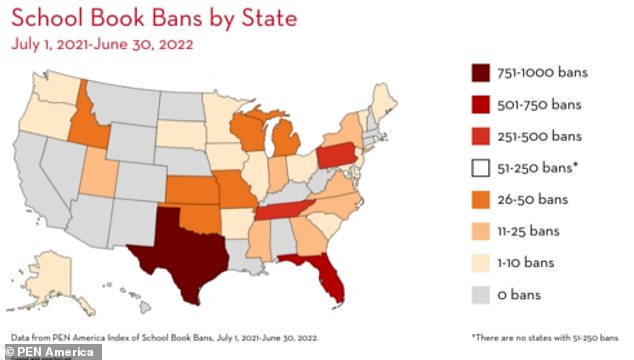
Efforts to ban books have quickly gathered momentum, with hundreds of titles being clipped in thousands of school libraries
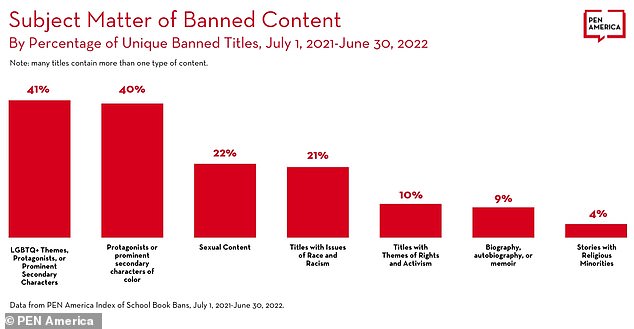
Much of the controversial content involves “culture wars” issues such as gender, sexuality, and race
Among other things, the proposal does not apply to books with “serious artistic significance” or “materials used in science courses”.
The bill would allow prosecutors to charge anyone who displays these materials in places children visit with a Class B misdemeanor.
The maximum penalty is 30 days in prison and a $1,500 fine.
The Republican-dominated House Judiciary Committee heard arguments Tuesday but did not vote on the measure.
Efforts to ban books have quickly gathered momentum, with hundreds of titles being cut into thousands of schools — often those dealing with “culture war” issues like gender, sexuality and race, a study shows.
There were 2,532 instances of individual book bans affecting 1,648 titles in about 5,000 schools with 4 million students in the 2021-2022 school year, anti-censorship group PEN America said in a report last year.
The group described a push by politicians and newly formed parent organizations to pull texts from school libraries that they liken to the anti-Communist McCarthy era and the “moral majority” purges of the early 1980s.
Frequently banned titles include Maia Kobabe’s Gender Queer: A Memoir and Angie Thomas’ The Hate U Give, which was inspired by the Black Lives Matter movement and made into a 2018 film.
America’s 5 Most Banned Titles:
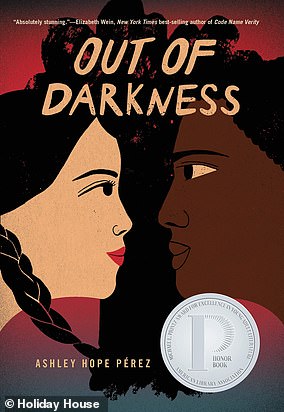
Gender Queer: A Memoir by Maia Kobabe has been banned by 41 school districts. The illustrated text depicts the author’s “journey of self-identity” and “what it means to be non-binary and asexual,” according to promotional materials.
All Boys Aren’t Blue, a series of personal essays by George M. Johnson, has been banned in 29 counties. The “Memoir Manifesto” tells the story of the childhood, youth and student days of its black, queer author
Out of Darkness by Ashley Hope Pérez is a novel about the childhood romance between a Mexican-American girl and a black boy in 1930s Texas. It has been banned in 24 counties.
The Bluest Eye has been banned in 22 districts. The first novel by acclaimed author Toni Morrison tells the story of a black girl growing up in the 1940s and her sense of inferiority because of the color of her skin.
Angie Thomas’ The Hate U Give has been banned in 17 districts. Inspired by the Black Lives Matter protest movement, it deals with police violence against minorities and was made into a film in 2018.

